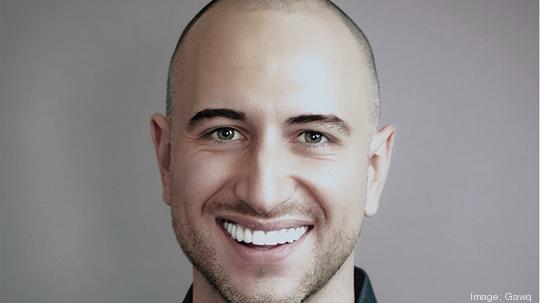
Austin-based entrepreneur Joshua Dziabiak has a new startup that helps people get a more diverse and informed view of the news. It's a complex endeavor, but, like many startup ideas, news curation app Gawq has its roots in a problem he experienced first-hand.
As chief marketing officer and chief operations officer at Austin insurtech startup The Zebra, as well as at his previous startup, ShowClix, Dziabiak had to make sure company marketing content made it in front of the right eyes on social media platforms.
He quickly learned it's a wild and often unfair world out there.
Years ago, as co-founder of Pennsylvania-based ShowClix, he saw how media placement was changing while working on social and paid media campaigns to drive brand awareness. The competition for eyeballs and engagement was fierce.
"It seemed like this really uneven playing field where all of the algorithms that were built were what you expect in the sense that they were fueling and promoting content that was... very sensational," he said. "It's always about what gets the most clicks."
It was a frustrating experience that continued when Dziabiak's attention shifted to The Zebra in more recent years.
"When we were trying to market that on these [social media] platforms, we literally couldn't get inventory in the early days because we were competing with these other advertisers that were basically using clickbait and bait-and-switch-type tactics to generate the traffic, which really works on these platforms because that's what people click," he said. "It felt completely backward to me that we had to kind of stoop to their low in order to get the word out."
The dynamic is also evident in news media, where juicy headlines drive clicks, often regardless of the underlying content.
"You see these things and you start to realize that there's a question lingering in the back of your mind 'Is this accurate, what I'm reading? Is this the full picture? Is there some political agenda here?' " he said. "I started to realize this is not just a generational problem. Yes, perhaps those who are less tech savvy are more susceptible. But the reality is that social media platforms and algorithms just get smarter, and people don't even realize they're in these bubbles."
While Dziabiak noticed the problem in marketing, his decision to launch Gawq was partially driven by a desire to do something with social impact after working at several more revenue-driven startups.
In fact, Gawq, which hit app stores and had its soft launch last week, is yet to establish a clear business plan.
"It's inevitable that we'll have a monetization model and perhaps even raise money," Dziabiak said. "But product one in my mind is to build an experience that is the antidote to these issues, and I felt like needed to put business aside and get the experience right first."
Gawq currently has three full-time developers, a part-time marketing and editing employee and a small team of moderators. Next year, Dziabiak said the team plans to build out local news features, a web-based news platform and develop its business plan.
How Gawq works
Building a news app is largely a matter of developing a large audience, which is why Dziabiak's first challenge is to become a news source for everyday readers.
That puts Gawq, in some ways, in competition with Apple News, Google News and other big players that pull and link content from new and traditional news organizations. Gawq's team has developed many of the same features you might find on other news apps that allow you to customize or prioritize your news feed. But he says Gawq differentiates by being a source that's focused on avoiding bias algorithms and bubbles where people don't get exposed to other valid views.
Gawq allows users to filter out non-news, including list stories, profiles and other pieces not tied to a current event. It also lets users filter out opinion pieces, celebrity gossip, sports and other types of news.
The app also lets users compare coverage of a given news story across a variety of sources (about 150 sources, so far), giving readers a look at how different news organizations cover the same developments. Gawq's news sources are largely based on their reach – it doesn't intentionally filter out fringe news organizations that have emerged, particularly in political reporting, in recent years.
"If I start to cherry pick sources... then I'm not ultimately going to get the large audience that ultimately might need it most," Dziabiak said.
Readers can also rate and review articles. Dziabiak sees this as a Wikipedia-style community that rates news stories based on balance by being asked specific questions. To reduce misuse, Gawq asks users to set aside their emotional reactions and focus on the balance of the story. It also requires people to explain why they believe an article is biased or un-biased.
The software then calculates a score, which users can submit to the platform or delete before posting. The system is buttressed by coding that looks to see if someone actually read the article -- as well as if someone is consistently reviewing all articles in a similar way.
"This is not going to be perfect," he said. "I think we can get to a place, though, where it's at least directionally helpful and accurate ... where, at scale, you have enough voices and intelligence in the system to detect bad user behavior."
Dziabiak said Gawq isn't an arbiter of truth -- it's a tool to make it easier to learn from the news and develop your own views. It's a news aggregator with crowdsourced reviews that get at the balance of news coverage.
In its first day after launching on Google and Apple app stores last week, Dziabiak said several thousand users registered to use Gawq.
Burnt out? Launch another startup
Gawq is the fifth startup Dziabiak has co-founded or led. He said he tends to get restless after seven or eight years in a particular role.
In leaving The Zebra in June this year, he stepped away from one of Austin's fastest-growing startups (though he remains on the company's board).
"It was a very exciting time at The Zebra, but I was also completely beginning to burn out because I was working so much and had been working like that for so many years," he said. "Even though it was an exciting time, that almost made it harder because I felt I should be motivated and should feel this type of excitement. But at the end of the day I just couldn't get there, and that's how I knew I should move on."
He was interested in misinformation and news media, but didn't know what the business might be.
"It started more as an exploration," he said. "The more I got into it, the more passionate I became and the more I realized there's an opportunity to do something great there. I'm just one of those people that's like, if you give me every reason not to do something, I'm going to do it. Internally, it felt like this is really difficult, so let's do it."







